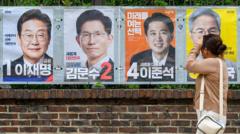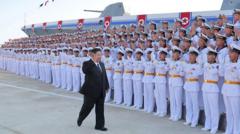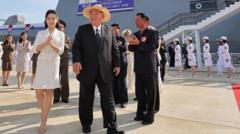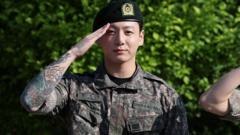With the election just days away, South Korea faces challenges including a divided public and a struggling economy. Voters will choose a new leader from six candidates, with Lee Jae-myung leading in polls after narrowly losing in 2022.
South Korea Prepares for Crucial Presidential Election Amidst Political Turmoil

South Korea Prepares for Crucial Presidential Election Amidst Political Turmoil
The upcoming presidential election in South Korea on June 3 follows the impeachment of former President Yoon Suk Yeol, raising significant political and economic implications.
The political landscape of South Korea is poised for change as the nation gears up for a presidential election on June 3. This snap election follows the controversial impeachment of former President Yoon Suk Yeol, who faced backlash after declaring martial law in December, an act that ignited widespread unrest and exposed deep societal rifts.
Having been ousted from office by a constitutional court that upheld his impeachment on April 4, Yoon's political decision-making has thrust South Korea into an unstable period marked by a succession of acting presidents. The nation is now turning its attention to the selection of a new leader who will bear the responsibility of navigating not only the fallout of Yoon’s actions but also ongoing national concerns, such as relations with North Korea and addressing an alarming decline in birth rates.
Voters will be presented with six candidates, including Lee Jae-myung of the liberal Democratic Party, who is currently leading the polls after a narrow defeat to Yoon in 2022. Lee, a former factory worker turned politician, has positioned himself as a champion for workers' rights and aims to advocate for a more equitable society. His main opponent, Kim Moon-soo from the conservative People Power Party, emphasizes economic growth and job creation, promising a business-friendly environment.
The election is timed amid other pressing issues, notably a serious decline in the country's fertility rate, which has reached a staggering 0.75, far below the 2.1 required to sustain population levels. Amid concerns of economic instability fueled by external pressures, including U.S. tariffs on South Korean goods, the new president will face significant challenges in steering the nation toward recovery.
For the first time in nearly two decades, this election sees no female candidates, a notable shift in a country that has slowly begun to break gender barriers in politics. As the election date approaches, South Koreans abroad have already participated with early voting from May 20 to 25, while domestic polling is set to run from 6:00 AM to 8:00 PM local time on June 3. Results will be released shortly after voting concludes, with the winner expected to be announced early the next day.
As South Korea stands on the cusp of a significant political turn, the implications of this election extend far beyond mere leadership; it will reflect the nation’s struggle for unity and purpose in a deeply divided society. Meanwhile, former President Yoon faces legal charges related to his martial law declaration, marking a turbulent chapter in South Korea's political history and adding further layers of complexity to the electoral landscape.
Having been ousted from office by a constitutional court that upheld his impeachment on April 4, Yoon's political decision-making has thrust South Korea into an unstable period marked by a succession of acting presidents. The nation is now turning its attention to the selection of a new leader who will bear the responsibility of navigating not only the fallout of Yoon’s actions but also ongoing national concerns, such as relations with North Korea and addressing an alarming decline in birth rates.
Voters will be presented with six candidates, including Lee Jae-myung of the liberal Democratic Party, who is currently leading the polls after a narrow defeat to Yoon in 2022. Lee, a former factory worker turned politician, has positioned himself as a champion for workers' rights and aims to advocate for a more equitable society. His main opponent, Kim Moon-soo from the conservative People Power Party, emphasizes economic growth and job creation, promising a business-friendly environment.
The election is timed amid other pressing issues, notably a serious decline in the country's fertility rate, which has reached a staggering 0.75, far below the 2.1 required to sustain population levels. Amid concerns of economic instability fueled by external pressures, including U.S. tariffs on South Korean goods, the new president will face significant challenges in steering the nation toward recovery.
For the first time in nearly two decades, this election sees no female candidates, a notable shift in a country that has slowly begun to break gender barriers in politics. As the election date approaches, South Koreans abroad have already participated with early voting from May 20 to 25, while domestic polling is set to run from 6:00 AM to 8:00 PM local time on June 3. Results will be released shortly after voting concludes, with the winner expected to be announced early the next day.
As South Korea stands on the cusp of a significant political turn, the implications of this election extend far beyond mere leadership; it will reflect the nation’s struggle for unity and purpose in a deeply divided society. Meanwhile, former President Yoon faces legal charges related to his martial law declaration, marking a turbulent chapter in South Korea's political history and adding further layers of complexity to the electoral landscape.




















